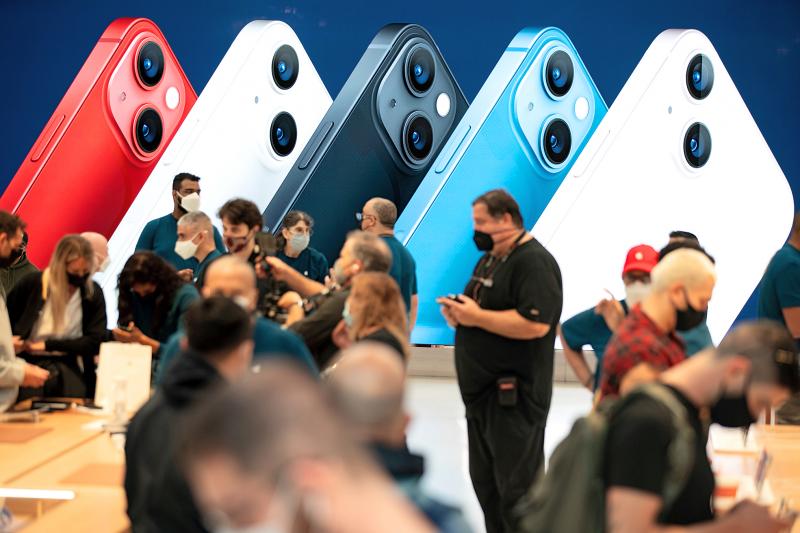Smartphone makers shipped 331.2 million units in the third quarter of the year, down 6.7 percent from 354.9 million units per year earlier, as supply chain constraints began to take effect, market research firm International Data Corp (IDC) said in a report last week.
Last quarter’s shipments were higher than the second quarter’s 313.2 million units, and although a slight decline was expected for the seasonally low third quarter, the actual decline for the period from July to September came in at more than twice the IDC’s forecast of a decline of 2.9 percent, it said on Thursday.
“Supply chain and component shortage issues have finally caught up to the smartphone market, which until now seemed almost immune to this issue despite its adverse impact on many other adjacent industries,” IDC research director Nabila Popal wrote in the report, adding that shortages are affecting all smartphone makers.

Photo: Bloomberg
“On top of component shortages, the industry has also been hit with other manufacturing and logistical challenges,” Popal said. “Stricter testing and quarantining policies are delaying transportation, and power supply constraints in China are restricting manufacturing of key components.”
The report said that smartphone makers have made efforts to mitigate the effects of supply issues, but have also lowered production targets for this quarter despite a continued strong demand worldwide.
“We don’t anticipate the supply-side issues to ease until well into next year,” Popal said.
Samsung Electronics Co retained its spot as the world’s largest smartphone maker in the third quarter, but shipments dropped 14.2 percent year-on-year to 69 million units, giving it a market share of 20.8 percent, the report said.
The South Korean company on Thursday said that it expects the chip crunch to persist through next year, with expectations that smartphone shipments would decline in the final quarter of this year.
Apple Inc regained the second position, with shipments increasing 20.8 percent to 50.4 million units on the early release of its iPhone 13 series.
The US company secured a 15.2 percent market share, the report said.
In China, Xiaomi Corp (小米) saw a 4.6 percent decline in shipments to 44.3 million units after percentage growth in the high double digits over the previous four quarters.
Shipments from Vivo Communication Technology Co (維沃) and Oppo Mobile Telecommunications Corp (歐珀) increased 5.8 percent and 8.6 percent to 33.3 million units and 33.2 million units respectively, the report said.
Xiaomi, Vivo and Oppo ranked third, fourth and fifth for shipments in the quarter with market shares of 13.4, 10.1 and 10 percent respectively.
Those Chinese makers continued to take advantage of a retreat by Huawei Technologies Co (華為), which dropped out of the top five this year due to the effects of US sanctions.
The report said that shipments decreased in all regions, but the greatest declines were in the central and eastern Europe regions at 23.2 percent, and the Asia-Pacific region, excluding Japan and China, at 11.6 percent.
The US, western Europe and China reported moderate falls of 0.2, 4.6 and 4.4 percent respectively in shipments from one year earlier, IDC said.

In Italy’s storied gold-making hubs, jewelers are reworking their designs to trim gold content as they race to blunt the effect of record prices and appeal to shoppers watching their budgets. Gold prices hit a record high on Thursday, surging near US$5,600 an ounce, more than double a year ago as geopolitical concerns and jitters over trade pushed investors toward the safe-haven asset. The rally is putting undue pressure on small artisans as they face mounting demands from customers, including international brands, to produce cheaper items, from signature pieces to wedding rings, according to interviews with four independent jewelers in Italy’s main

Japanese Prime Minister Sanae Takaichi has talked up the benefits of a weaker yen in a campaign speech, adopting a tone at odds with her finance ministry, which has refused to rule out any options to counter excessive foreign exchange volatility. Takaichi later softened her stance, saying she did not have a preference for the yen’s direction. “People say the weak yen is bad right now, but for export industries, it’s a major opportunity,” Takaichi said on Saturday at a rally for Liberal Democratic Party candidate Daishiro Yamagiwa in Kanagawa Prefecture ahead of a snap election on Sunday. “Whether it’s selling food or

CONCERNS: Tech companies investing in AI businesses that purchase their products have raised questions among investors that they are artificially propping up demand Nvidia Corp chief executive officer Jensen Huang (黃仁勳) on Saturday said that the company would be participating in OpenAI’s latest funding round, describing it as potentially “the largest investment we’ve ever made.” “We will invest a great deal of money,” Huang told reporters while visiting Taipei. “I believe in OpenAI. The work that they do is incredible. They’re one of the most consequential companies of our time.” Huang did not say exactly how much Nvidia might contribute, but described the investment as “huge.” “Let Sam announce how much he’s going to raise — it’s for him to decide,” Huang said, referring to OpenAI

The global server market is expected to grow 12.8 percent annually this year, with artificial intelligence (AI) servers projected to account for 16.5 percent, driven by continued investment in AI infrastructure by major cloud service providers (CSPs), market researcher TrendForce Corp (集邦科技) said yesterday. Global AI server shipments this year are expected to increase 28 percent year-on-year to more than 2.7 million units, driven by sustained demand from CSPs and government sovereign cloud projects, TrendForce analyst Frank Kung (龔明德) told the Taipei Times. Demand for GPU-based AI servers, including Nvidia Corp’s GB and Vera Rubin rack systems, is expected to remain high,